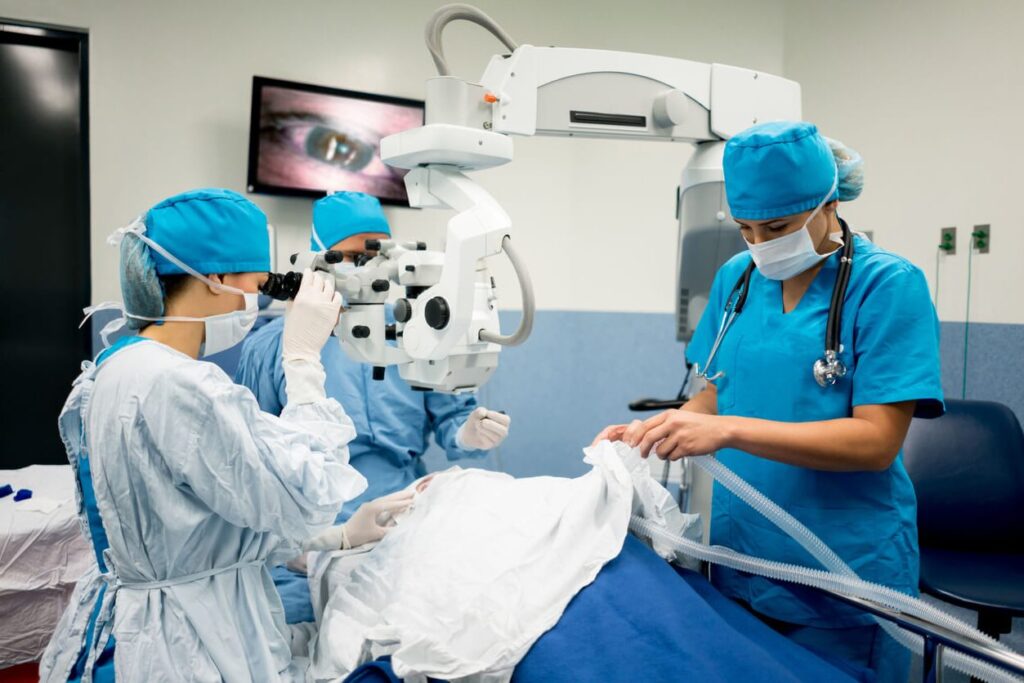Cataract surgery is a common procedure that can significantly improve vision for individuals experiencing vision problems due to cataracts. If you are considering cataract surgery in Sydney, it is crucial to choose the right specialist to ensure the best possible outcome. In this article, we will discuss all the essential factors you need to consider when selecting a specialist for cataract surgery.
Understanding Cataract Surgery
What is Cataract Surgery?
cataract surgery sydney is a transformative surgical procedure that involves delicately removing the cloudy lens of the eye, which has been affected by the natural aging process or other factors, and replacing it with a clear artificial intraocular lens (IOL). This innovative procedure is typically recommended when cataracts begin to interfere with your daily activities, such as reading, driving, or recognizing faces. Cataracts can manifest as symptoms like blurry vision, decreased color perception, and increased sensitivity to light, impacting your quality of life.
During cataract surgery, the ophthalmologist uses advanced techniques and tools to precisely remove the clouded lens and implant a new, customized IOL. This replacement lens can significantly improve your vision and restore clarity, allowing you to see the world with renewed sharpness and vibrancy. The procedure is usually quick and performed on an outpatient basis, with many patients experiencing noticeable visual improvement shortly after surgery.

Why is Choosing the Right Specialist Important?
Choosing the right specialist for your cataract surgery is a critical decision that can profoundly influence the outcome of the procedure and your long-term eye health. An experienced cataract surgeon brings a wealth of expertise and precision to the operating room, ensuring that the surgery is conducted with the utmost care and skill. By selecting a reputable specialist, you can rest assured that you are in capable hands and that every aspect of your eye health is being carefully considered.
Moreover, a dedicated cataract specialist will offer personalized attention and support throughout your entire treatment journey, starting from the initial consultation where your unique visual needs and concerns are addressed. They will guide you through pre-operative preparations, the surgical process itself, and the crucial post-operative period, ensuring that you feel informed and confident at every stage. Establishing a trusting relationship with your cataract surgeon is key to achieving optimal results and maintaining the health and clarity of your vision for years to come.
Factors to Consider When Choosing a Specialist
Specialist’s Experience and Qualifications
One of the first factors to consider when choosing a specialist for cataract surgery is their experience and qualifications. Look for a specialist who has extensive experience in performing cataract surgeries and a proven track record of successful outcomes. It is also essential to ensure that the specialist is board-certified and stays updated with the latest advancements in cataract surgery techniques and technology.
Furthermore, consider the specific expertise of the specialist. Some cataract surgeons may have additional training or specialization in certain types of cataracts or advanced surgical techniques. This specialized knowledge can be beneficial in ensuring that you receive the most appropriate and effective treatment for your specific condition.
Hospital or Clinic Infrastructure
The hospital or clinic where the specialist performs the surgery also plays a significant role in your experience and the success of the procedure. Make sure that the facility is well-equipped with advanced technology and has a sterile and safe environment. Additionally, consider the location of the hospital or clinic, as convenience can greatly impact your overall experience.
When evaluating the infrastructure of the hospital or clinic, inquire about the support staff involved in the cataract surgery process. A skilled and experienced team of nurses, anesthesiologists, and technicians can contribute to a smoother and more efficient surgical experience, ensuring that you receive comprehensive care from the moment you arrive at the facility.
Patient Reviews and Recommendations
Reading patient reviews and seeking recommendations from friends, family, or optometrists can provide valuable insights into the quality of care provided by a particular specialist. Positive reviews and recommendations indicate a high level of patient satisfaction and can give you confidence in your decision.
Additionally, consider scheduling a consultation with the specialist to discuss your concerns, ask any questions you may have, and assess their communication style and bedside manner. A compassionate and communicative specialist can help alleviate any anxiety or apprehension you may have about the cataract surgery process, fostering a sense of trust and collaboration throughout your treatment journey.
Preparing for Your Cataract Surgery
Initial Consultation and Eye Examination
Before your cataract surgery, you will have an initial consultation with your chosen specialist. This consultation is a crucial step in the process, as it allows the specialist to gather essential information about your eye health. During the examination, the specialist will carefully assess the severity of your cataracts and evaluate the overall health of your eyes. By conducting a comprehensive eye examination, the specialist can determine the most appropriate treatment plan tailored to your specific needs.
Moreover, the initial consultation is an opportunity for you to address any concerns or questions you may have about the surgery. Feel free to discuss your expectations and fears with the specialist, as open communication is key to a successful outcome. The specialist will guide you through the entire process, ensuring you feel confident and well-informed every step of the way. Read about Eye Examinations and how they are conducted at https://health.uconn.edu/eye-care/patient-information/eye-exam/
Discussing Your Surgery Options
During the consultation, your specialist will delve into the various surgery options available to you, shedding light on the innovative technologies and techniques used in cataract surgery. One crucial aspect of this discussion is the selection of the intraocular lens (IOL) that will be implanted during the procedure. The specialist will take into account your unique lifestyle and visual requirements to recommend the most suitable IOL for your individual case.
Furthermore, the discussion about surgery options is an opportunity for you to actively participate in the decision-making process. By sharing your preferences and goals with the specialist, you can collaborate to choose a treatment plan that aligns with your expectations. Remember, your active involvement in this discussion ensures that the chosen surgical approach not only addresses your cataracts but also enhances your overall visual quality and satisfaction post-surgery.
The Cataract Surgery Procedure
When it comes to cataract surgery, understanding the procedure can help ease any anxiety you may have. Cataract surgery is a common and highly successful outpatient procedure that does not require an overnight stay at the hospital. The surgery is typically performed under local anesthesia, ensuring that you remain comfortable throughout the process. This means you will be awake during the surgery, but your eye will be numbed to prevent any pain or discomfort.
During the surgery, the ophthalmologist will make a small incision in the eye to access and remove the cloudy lens that is causing vision problems. Once the cataract is removed, it will be replaced with an artificial intraocular lens (IOL) that will help restore clear vision. The entire surgical procedure usually takes around 20 minutes, making it a quick and efficient process.
Post-Surgery Care and Follow-ups
After the cataract surgery, proper post-operative care is crucial for a successful recovery. You will be provided with detailed instructions on how to care for your eyes following the surgery. It is important to follow these instructions carefully to promote proper healing and reduce the risk of complications. Your ophthalmologist will schedule follow-up appointments to monitor your progress and ensure that your eyes are healing as expected.
During these follow-up appointments, your specialist will examine your eyes, check your vision, and address any concerns or questions you may have about your recovery. These appointments are essential for tracking your healing process and making any necessary adjustments to your post-operative care plan. Remember, while cataract surgery is a routine procedure, proper care and follow-up are key to achieving the best possible outcome for your vision. Click here to learn more about Post-Surgery Care.
Costs and Insurance Considerations
Understanding the Costs Involved
Before undergoing cataract surgery, it is crucial to have a clear understanding of the costs involved. The cost of cataract surgery can vary depending on several factors, such as the specialist’s fees, the facility charges, the type of IOL chosen, and any additional tests or procedures required. Make sure to consult with your specialist and the hospital’s billing department to get a comprehensive estimate of the costs.
When it comes to specialist fees, it’s important to note that they can vary based on the surgeon’s experience, reputation, and location. Surgeons with extensive experience and a stellar reputation may charge higher fees, but their expertise can provide you with peace of mind and potentially better outcomes. On the other hand, less experienced surgeons may offer lower fees, but it’s crucial to carefully consider their qualifications and track record before making a decision.
In addition to specialist fees, facility charges also play a significant role in the overall cost of cataract surgery. The facility charges typically include the use of the operating room, nursing staff, and other resources necessary for the procedure. Different hospitals or clinics may have varying fee structures, so it’s essential to inquire about these charges during your consultation.
Another factor that can impact the cost is the type of intraocular lens (IOL) chosen for your surgery. There are various types of IOLs available, including monofocal, multifocal, and toric lenses. Each type has its own advantages and price range. Your specialist can guide you in selecting the most suitable IOL based on your specific needs and lifestyle.
Lastly, additional tests or procedures may be required before or during cataract surgery, depending on your individual circumstances. These tests, such as optical coherence tomography (OCT) or biometry, can provide your surgeon with valuable information to ensure the best possible outcome. It’s important to discuss these potential additional costs with your specialist and understand why they may be necessary.
Navigating Health Insurance for Cataract Surgery
Health insurance coverage for cataract surgery can vary depending on your insurance provider and your specific policy. In many cases, cataract surgery is covered by insurance, but it is essential to understand your coverage limits, copayments, and any pre-authorization requirements. Your chosen specialist and their administrative staff can assist you in navigating the insurance process and ensuring you receive the maximum coverage available.
Before proceeding with cataract surgery, it’s crucial to contact your insurance provider and inquire about the specifics of your coverage. Some insurance policies may require pre-authorization, which means you need approval from your insurance company before the surgery can take place. Your specialist’s office can help you with the necessary paperwork and documentation to facilitate this process.

Additionally, it’s important to understand the copayments or out-of-pocket expenses you may be responsible for. These costs can vary depending on your insurance policy and the specific terms outlined in your plan. By discussing these details with your insurance provider and your specialist’s office, you can have a clearer understanding of your financial obligations.
Furthermore, it’s important to note that while cataract surgery is generally covered by insurance, certain premium IOLs or advanced technologies may not be fully covered. These premium options can provide enhanced vision correction or reduce the need for glasses after surgery. If you’re interested in these advanced options, it’s essential to discuss the associated costs and potential out-of-pocket expenses with your specialist.
Understanding the costs and navigating health insurance coverage for cataract surgery can seem overwhelming, but with the guidance of your specialist and their administrative staff, you can make informed decisions about your treatment. By exploring all the available options, discussing your concerns, and understanding the financial aspects, you can embark on your cataract surgery journey with confidence.
Related : Cataract Eye Surgery: How It Can Transform Your Vision